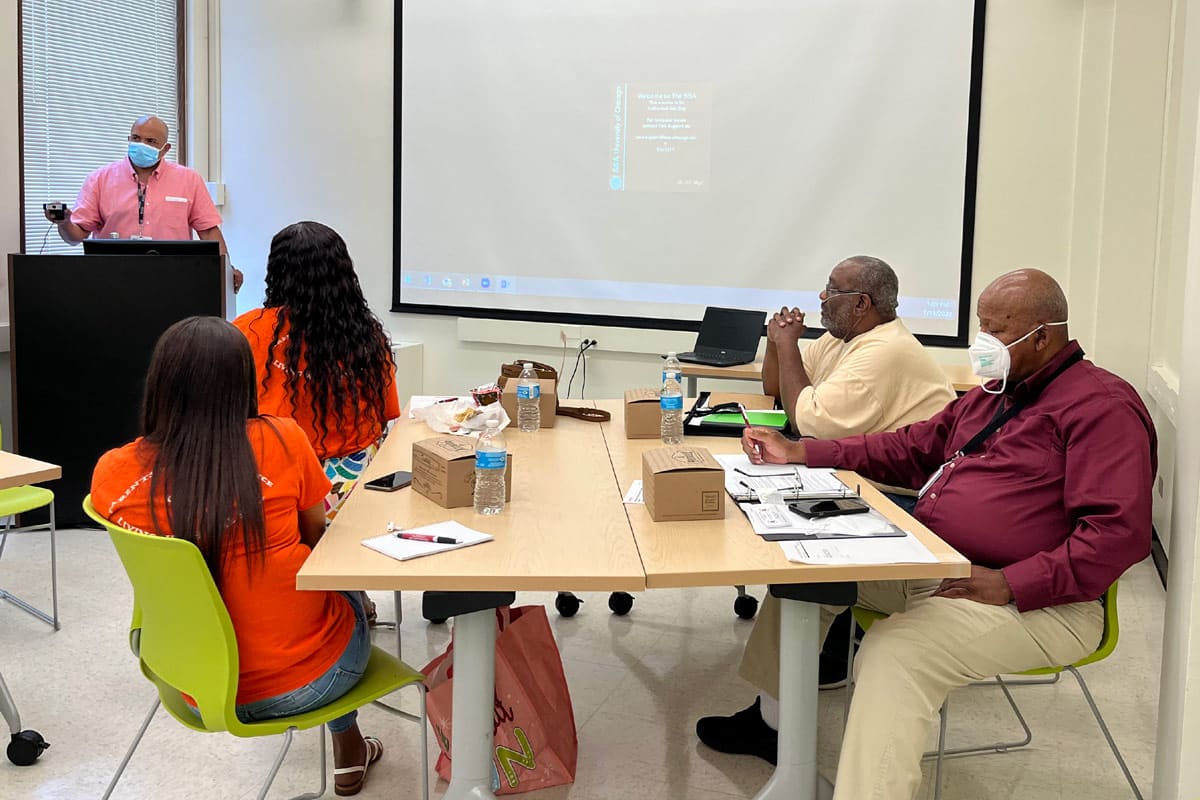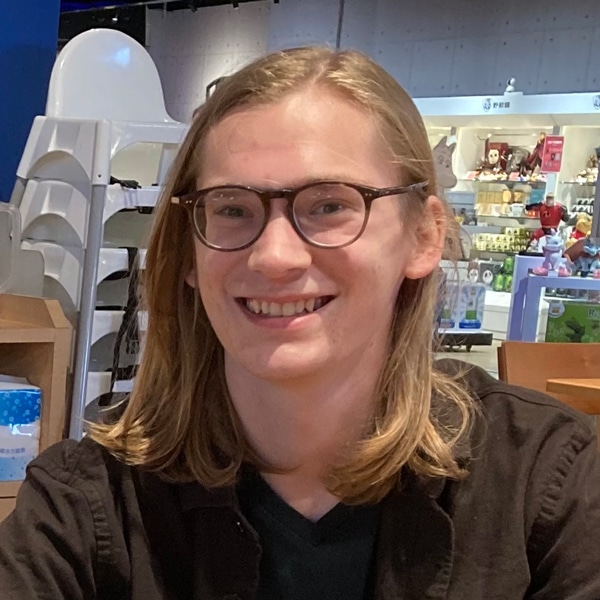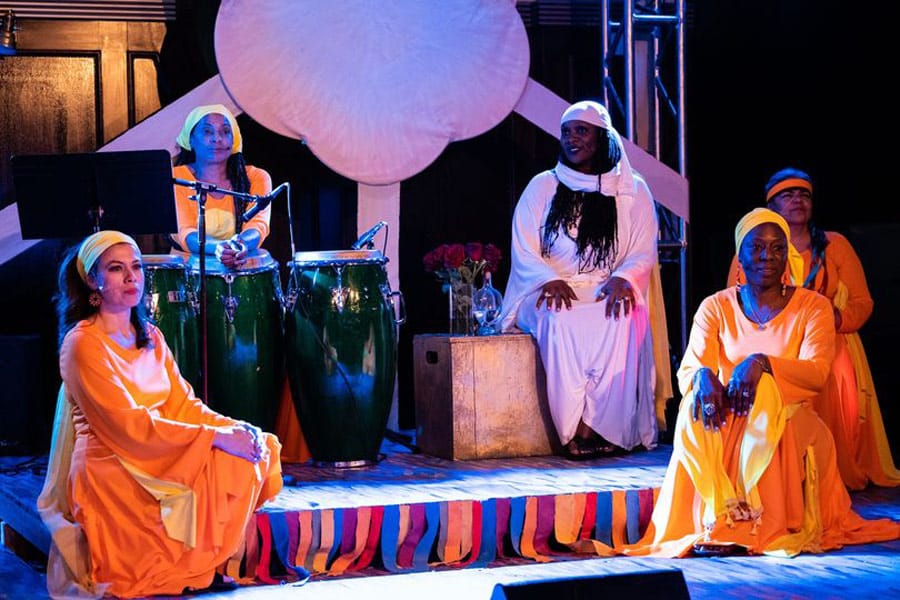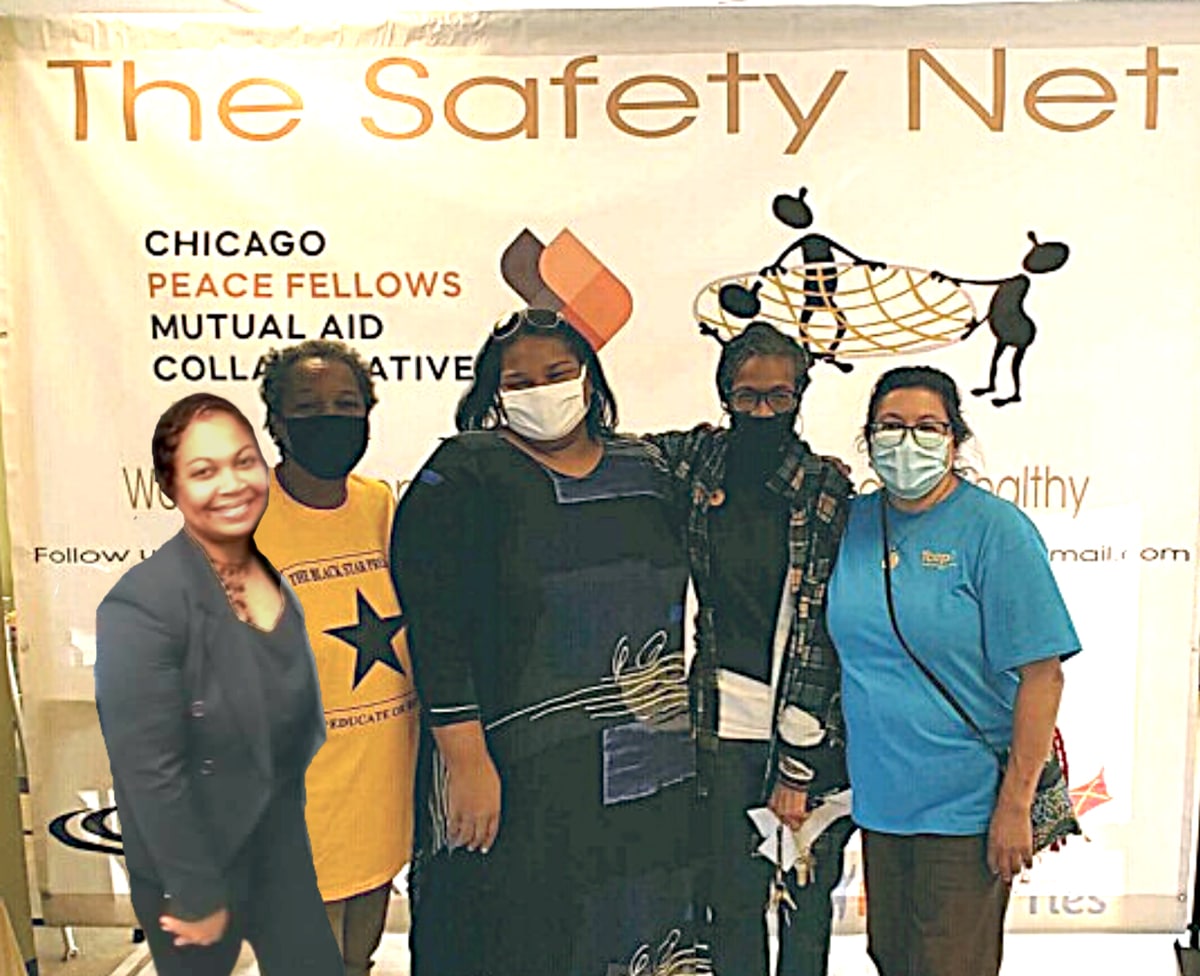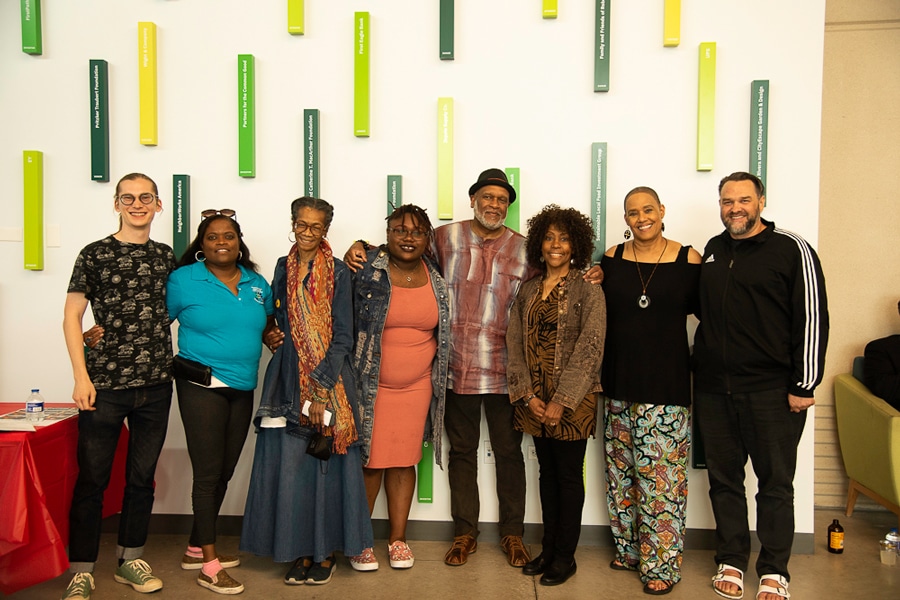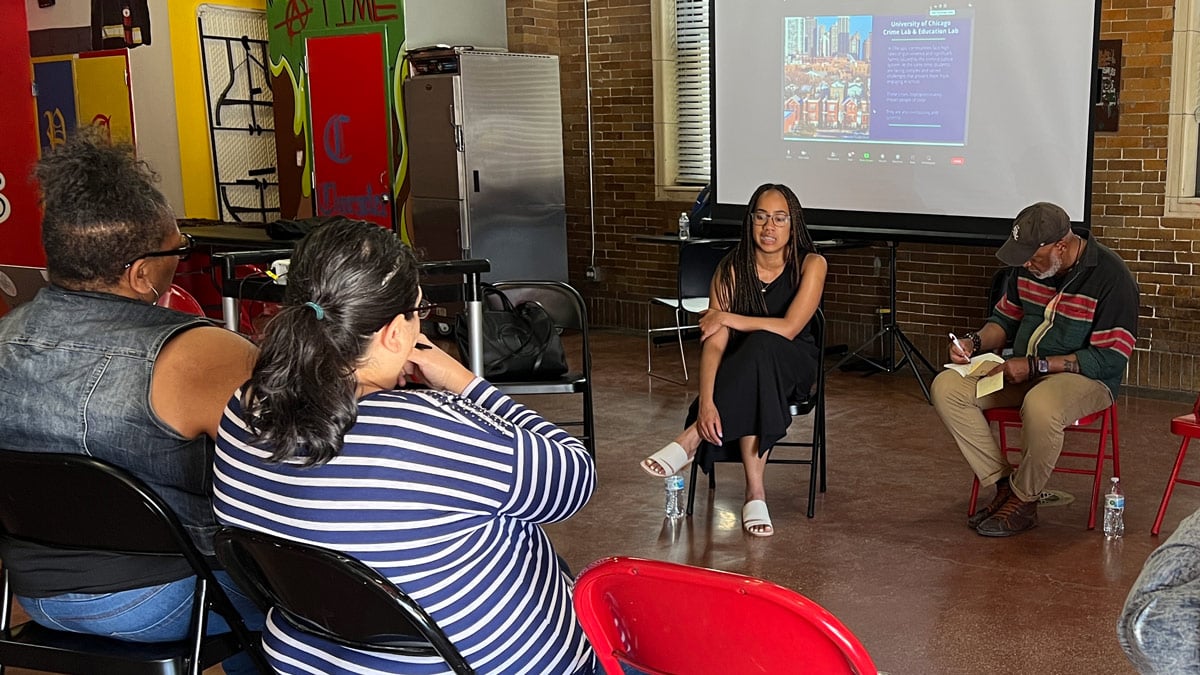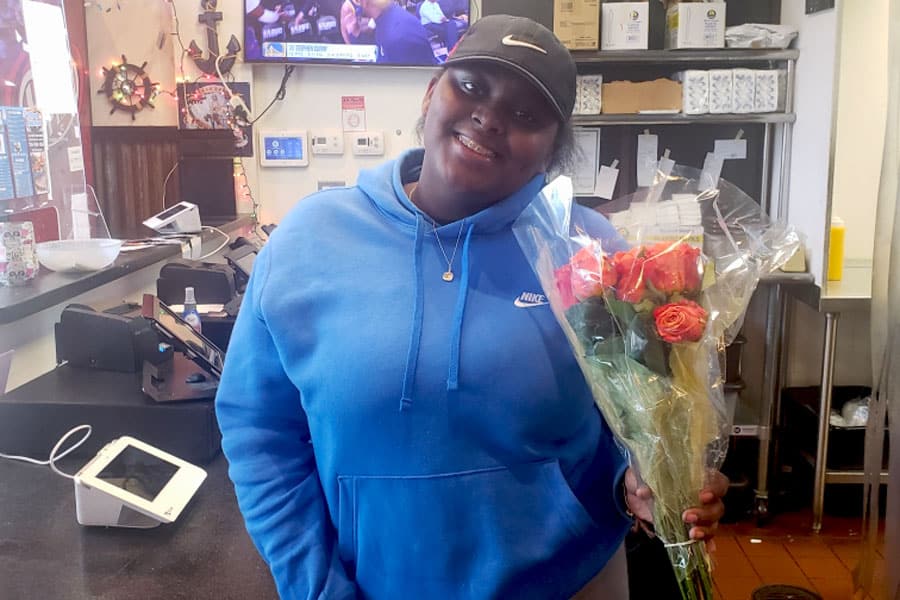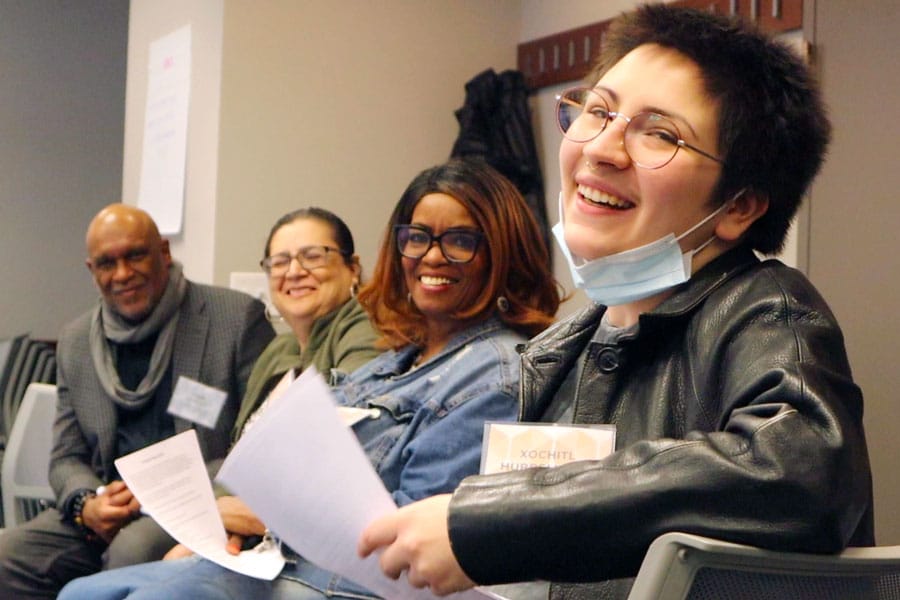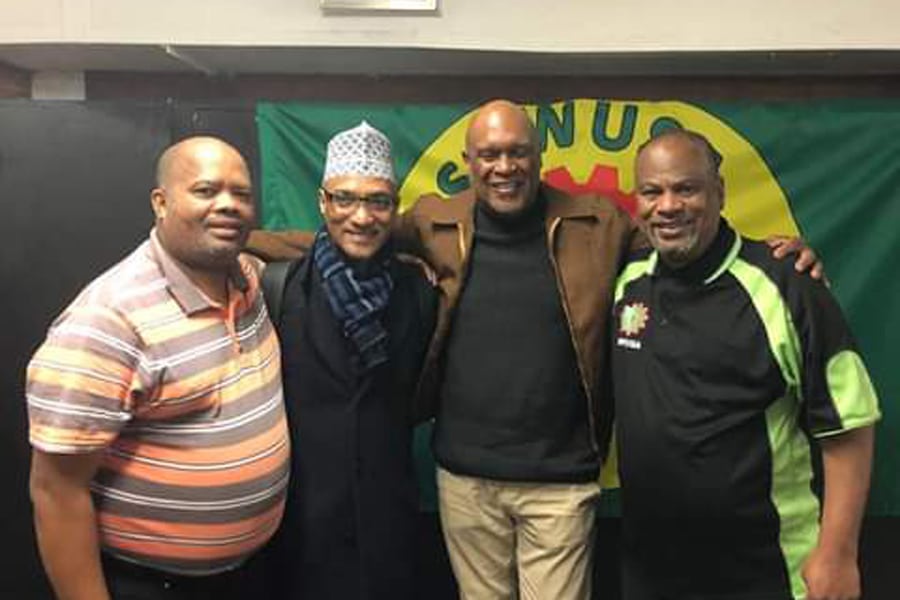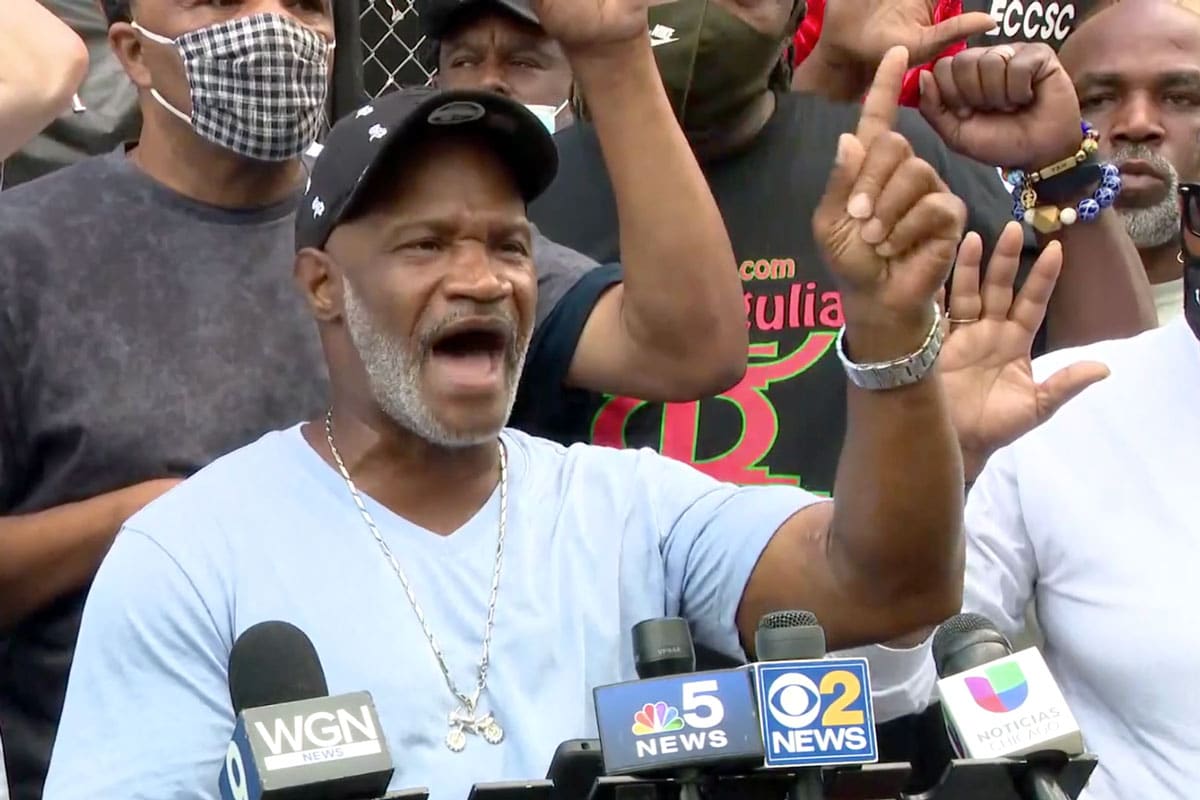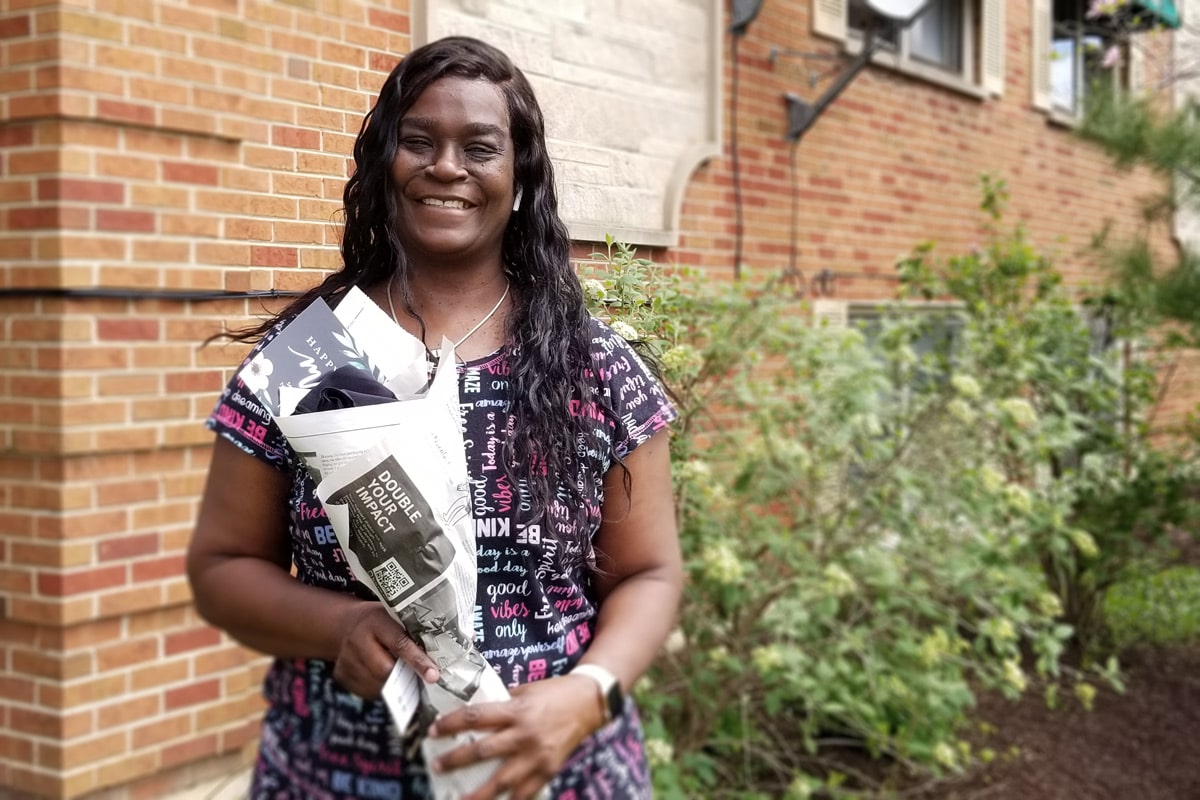Mutual Aid Collaborative Builds Connections with UChicago Medicine Violence Recovery Program
On Tuesday, July 19th, Peace Fellows and members of the community met with University of Chicago Medicine’s Violence Recovery Program (VRP). The event was held as part of the Mutual Aid Collaborative’s Civic Leader series, which aims to build connections between individuals and organizations that work to build peace and prevent violence. At their meeting, Peace Fellows spoke with Dr. Franklin Cosey-Gay, the Director of the VRP as well as Carlos Roble, a Clinical Lead/Social Worker in the VRP. Fellows learned about what the hospital does for victims of intentional violence as well as some of the root causes of violence that the Violence Recovery team hope to address.
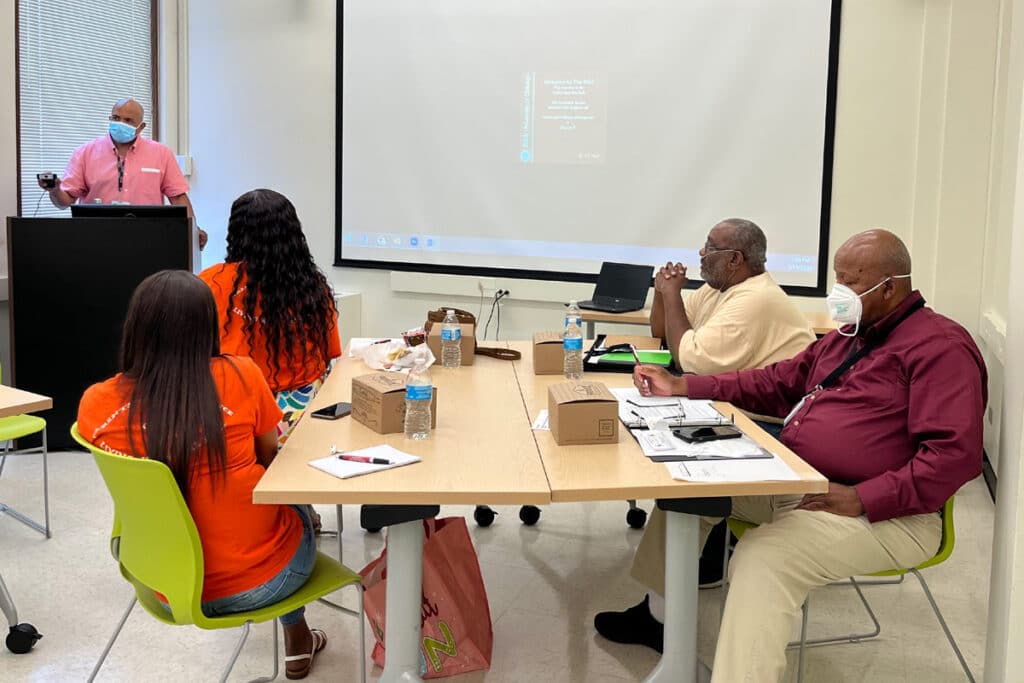
Dr. Cosey-Gay walked Peace Fellows through the history of the Violence Recovery Program at the University of Chicago Medical Center and began by discussing the structural issues that the Program was designed to address. The VRP was started in 2018, with only two violence recovery specialists involved. The trauma center was created to provide more equitable access to high-quality health care and trauma treatment services on Chicago's South Side, specifically neighborhoods impacted by systemic violence. The VRP team views violence through a public health lens, which aims to address structural causes of violence, rather than blaming the individual. Because of this, the VRP seeks to make adjustments to the medical system that provide services to individuals affected by violence to promote equity and reduce the outbreak of further violence.
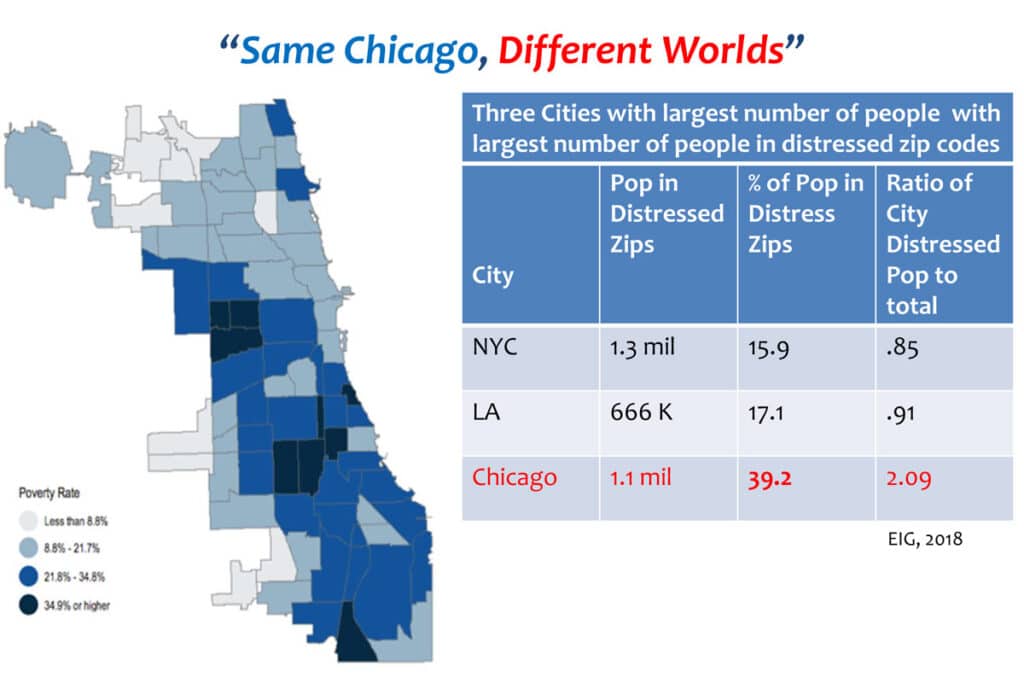
The Violence Recovery Team stressed that their framework of understanding violence through a public health framework goes beyond understanding treatment and rehabilitation on an individual level but also aims to prevent violence through examining relational, communal, and societal factors. Their presentation focused on why there are higher risk factors of violence on the Southside and particularly in predominantly Black neighborhoods. Chicago has a history of racial tensions that developed over time through restrictive covenants, redlining, urban renewal projects, and policing. These structural forces have deeply impacted South Side communities and the VRP is hoping to rebuild trust in public health institutions by gaining credibility and working with community based organizations. Meeting with Peace Fellows and members of the community acted as a way for the VRP to continue building credibility with organizations that work in violence prevention so that they can collaborate to address violence as a public health concern.
The Violence Recovery Program also operates on an individual level, acting to protect victims of violence and their families from disruptions that can be physically or emotionally harmful.
"Violence Recovery is about public health. We don't focus on fault or blame, we focus on prevention." -- Dr. Cosey-Gay
Dr. Cosey-Gay emphasized since the role of the Violence Recovery team is to act as public health professionals, they “neither determine fault nor place blame, but focus on prevention.” Oftentimes, social workers in the VRP act to keep police away from victims of violence so that they have time and space to heal and are given time to recover before questioning. Carlos Robles, a social worker in the VRP noted:
“We don't want to treat victims of violence as criminals, but as experts in their own lives.”
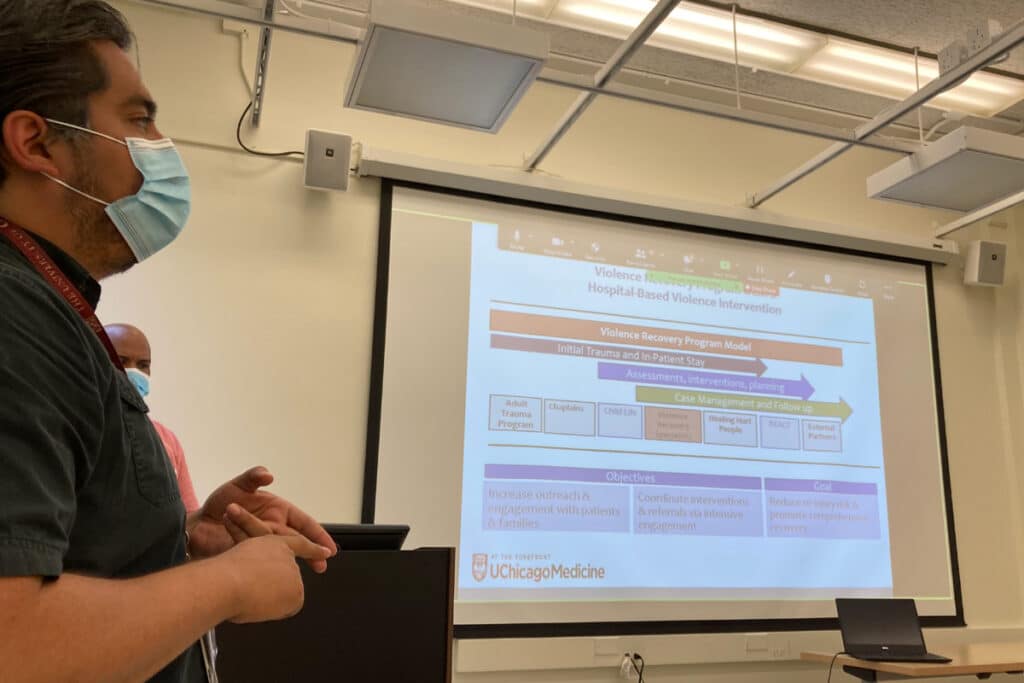
Today the Violence Recovery Program at University of Chicago Medicine has 15 full-time employees and offers 24-hour care to victims of intentional violence. Their care extends outside of the hospital as they also help patients and families navigate external health care and social services. As Peace Fellows and community members got to know the services of the VRP, they were surprised at the amount the program has grown in the last four years. Many of the attendees shared their own experiences navigating hospitals alongside victims of intentional violence and welcomed the new approach to violence recovery offered by the program. One attendee told a story about how she was not offered an opportunity to see her son’s body after he was the victim of violence and emphasized how traumatic this experience was for her. If a violence recovery program had been in place, some of the trauma of this experience could have been avoided and more trust could have been built between the hospital and the community.
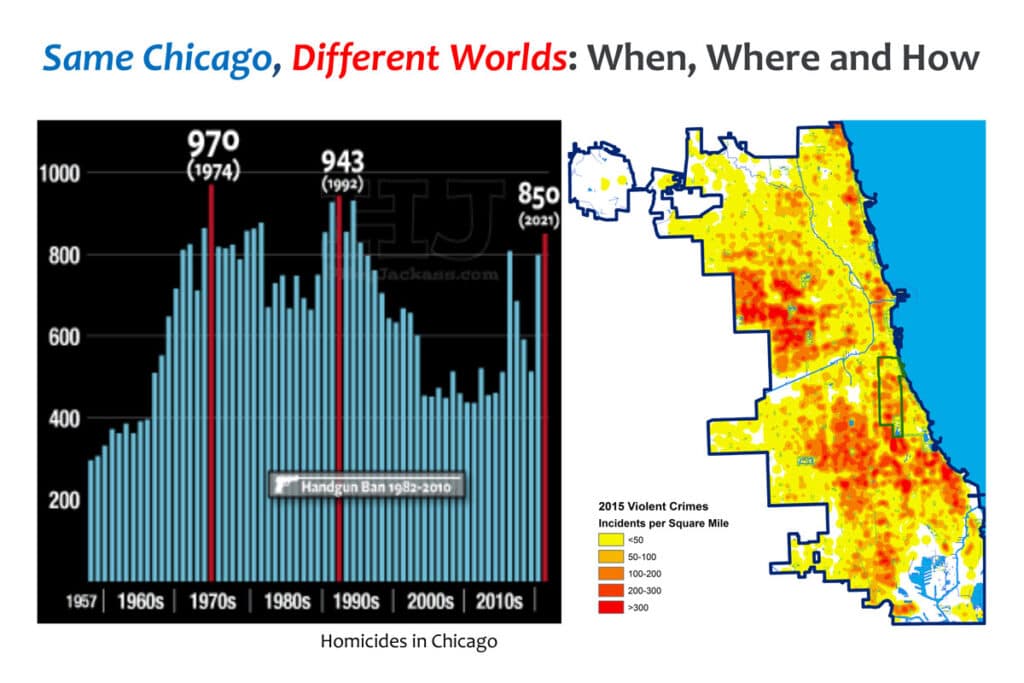
Getting to know the services and history of the Violence Prevention Program helped Peace Fellows and community members build a mutually beneficial relationship with the hospital. By gaining connections to community-based organizations the VRP builds credibility and gains new resources to direct victims of violence to with the aim of preventing further violence. Members of the community similarly benefited from learning about how approaches to treating intentional violence have improved over time and from gaining a better understanding of how the trauma center could treat members of their communities. Through this meeting, Peace Fellows gained new opportunities for collaborations that have the potential to bring lasting peace to their communities.
Moonset Sunrise Promotes Social Justice Through Theater
By Zeki Salah, Facilitator, Mutual Aid Collaborative
From June 8-18, Chicago Peace Fellow, Pilar Audain, acted as a guide for Moonset Sunrise, a theatrical experience rooted in healing, self-care and collective growth through song, storytelling, dance and ritual. Pilar co-created the program alongside the theater company Collaboraction as the inaugural event for Beat Kitchen's new restaurant/lounge and event space: Bar Sol.

Moonset Sunrise was conceptualized by Collaboraction, a social justice theater that builds knowledge, empathy, dialogue and action around oppression and inequity through live theater, film and online interactive programs. Pilar was approached by Carla Stillwell and Anthony Mosely of Collaboraction because they wanted to produce something that would promote healing and connection in the community and had heard of her experience doing ritual healing work. Pilar’s healing work on the Southside, as well as her use of ancient indigenous art forms as healing modalities attracted a lot of attention to her work and the team at Collaboraction asked her to be a priest in their latest production, Moonset Sunrise.

While the team at Collaboraction provided set design, musicians, dancers, and other artists, Pilar was tasked with creating a release experience for members of the audience. Pilar relied on audience participation to create a feeling of freedom and emotional release. For instance, at one point in the play, members of the audience were given a paper and pencil and asked to write down their emotions. They were then told to give the paper to a Goddess statue before the paper was burned by Pilar. By allowing space for emotional vulnerability and reflection, Moonset Sunrise aimed to provide audience members with an acceptance of who they are.

One of the goals of Moonset Sunrise was to make members of the audience feel as though they were entering a safe space and leaving their ordinary lives behind. Pilar and the team at Collaboraction aimed to create an atmosphere where people viewed different forms of art that elicited different emotions. Pilar’s vision of the set and performance were delivered by Collaboration “in the most organic and beautiful way.”

The set of the event included a mock sanctuary with running water that visitors encountered when they came into the auditorium. As audience members watched libations and sacred dances, they were encouraged to relax and focus on their breathing. By creating an immersive experience with different art forms, Moonset Sunrise provided audience members with a variety of modalities through which they could experience healing and release.
One of the outcomes of Moonset Sunrise was that people expected one thing and received what they did not know they needed. -- Pilar Audain Reed

She encouraged members of the audience to focus on the events that led them to their current positions, so that they could better understand themselves. During performances, many members of the audience expressed difficult relationships with loved ones and allowed for a breakdown of the emotional boundaries that are raised in everyday life. This freedom allowed them to focus on how they suffer in many of the same ways and helped them find a common humanity amongst themselves. By the time Moonset Sunrise concluded, many members of the audience were provided with a transformative experience that left them feeling a bit lighter and freer.
Safety Net Launches Blood Drive
By Zeki Salah, Facilitator, Mutual Aid Collaborative
Chicago Peace Fellows are working to address an increased demand for blood from Black and Brown donors through holding a Mutual Aid Collaborative Blood Drive. The Blood Drive is part of an ongoing Safety Net project by the Chicago Peace Fellows Mutual Aid Collaborative, a group of 60 Black and Brown leaders and committed allies who live and work in the communities they serve on the South and West sides. Fellows working on the Safety Net project seek to address multiple pandemics that ail the South and West Sides of Chicago, including COVID-19 and community violence.

The Safety Net campaign is accepting donation pledges until June 28th, but you can donate at any time after making the pledge. You can sign up for the Safety Net team’s blood drive here: https://sleevesup.redcrossblood.org/campaign/give-from-the-heart/
You can also promote the blood drive by using the hashtag: #OurBloodMatters
The Safety Net project started at the height of the COVID-19 pandemic by creating a distributed network of PPE providers throughout a grassroots network, but has since expanded its scope to include broader public health issues. Since its inception, the Safety Net project has also held COVID vaccine clinics to address the disproportionate impact of COVID-19 on Black and Brown communities. The Chicago Peace Fellows Blood Drive is the latest project by the Safety Net team and seeks to address a shortage of Black and Brown blood donors.

More Black and Brown donors are needed in the United States because of a rise in demand for some rare blood types that are more common in people of Black heritage. Certain subtypes of blood need to be matched to treat blood diseases such as sickle cell anemia. Blood donors are screened to see if they might possess certain rare blood types, which can also help match plasma and bone marrow donors. The demand for blood that the Safety Net team seeks to address is expected to increase even more during the summer, due to the increase of accidents such as car crashes and fireworks, as well as spikes in cycles of gun violence. This can put patients who need blood in consistent quantities at risk as these sorts of incidents risk depleting the blood reservoir that their treatments draw from.
The Safety Net wanted to bring attention to the need for a more diverse blood bank after learning that the director of the Chicago Peace Fellows, Burrell Poe, was diagnosed with aplastic anemia. Treatment for aplastic anemia requires bone marrow transplants, which can only be performed if the donor and recipient have matching subtypes of blood. In solidarity with Burrell, the Safety Net team scheduled their Blood Drive around his birthday, so that members of the community could be made aware of the importance of blood donations and their potential to transform the lives of other people.

Jacquelyn Moore of the Safety Net team donated blood in response to the blood drive and found the experience to be fulfilling as an altruistic act, while also gaining new insights into her own health. Jackie was touched by the campaign on a personal level because a blood drive saved her husband’s life after it connected him with a match for a stem cell transplant. She stated “giving blood provides a way to directly help the community and provides people with an opportunity to act, to improve the lives of people around them.” Additionally, Jackie noted the pragmatic benefits donors receive when giving blood. After giving blood, she was contacted by the Red Cross and given a report of her COVID-19 antibodies. She noted that the Red Cross also provides other reports on other aspects of the health of its donors and can act as a free health screening. At the screening, vital signs are checked and problems such as high blood pressure, arrhythmia, or low hemoglobin levels can be detected.
The Safety Net team’s blood drive campaign also seeks to dismiss myths about giving blood. They assert that giving blood is not painful, and can even be relaxing as it gives the donor an opportunity to sit back and take a break from the hustle and bustle of the day. Additionally, the Safety Net encourages members of the LGBTQ+ community to explore the possibility of giving blood, because many of the previous restrictions against donors within this community have been lifted. Lastly, the Safety Net team emphasizes the safety of giving blood, donation centers undergo strict COVID precautions and there is a low risk of contracting COVID while giving blood.
Second Annual Chicago Peace Fellows Music Festival
By Zeki Salah, Mutual Aid Collaborative Facilitator
The Chicago Peace Fellows held a Concert for Peace on June 4th, celebrating the artistic accomplishments of their communities and a shared commitment to improving their neighborhoods. The Second Annual Chicago Peace Fellows Music Festival was held at the Hatchery in Garfield Park with Peace Fellows gathering performers from across the city to play music, sing songs, read poetry, and dance. The Music Festival was organized by a committee within the Peace Fellows Mutual Aid Collaborative, a group of 60 Black and Brown leaders and committed allies who live and work in the communities they serve on the South and West sides.

The event was made streamed live on the Goldin Institute’s Facebook page where you can watch the recording.
The Music Festival Committee is made up of musicians and educators that have first hand experience with the transformative power of music and its positive impact on communities. The committee pooled their connections to create a lineup with a diversity of talents that represented neighborhoods across the city. The Peace Fellows Music Committee is made up of Peace Fellow Alumni from across the cohorts of 2019, 2020 and 2021: Gloria Smith of the Black Star Project, Angelina Zayas of the GAP Center, Juliet Jones of the Original 64th Street Beach Drummers, Margaret Murphy-Webb of the South Side Jazz Coalition, Marvinetta Penn of Global Girls, Inc., Rashada Dawan of B.Fli Productions, and Robin Cline of Neighborspace.

As musicians, artists, and educators, members of the committee had an eye for both talent and opportunity, bringing together talented members from their communities to perform. Many of the performers at the Peace Fellows Music Festival were young people for whom the festival provided an opportunity to gain experience performing, show off their talents, and be compensated for their time and effort. Additionally, by bringing together artists from across the city, the Peace Fellows Festival allowed for them to network with each other and collaborate in their artistic ventures.

The Peace Fellows Music Festival featured an eclectic range of performances, including jazz, hip hop, and classical music, as well as spoken word poetry and choreographed dances. Finding talent for the Festival was a collaborative effort, with multiple organizations spreading the word and connecting talent to the festival.
Performers included:
- Guru Tonic
- Heart Cry
- Kenya Braitwaite
- Mara Mitchell
- Global Girl Youth Company
- Phoenix
- The Original 64th Street Drummers
- Margaret Murphy-Webb
- MC Skool
- Ethan Clay
The Festival was held at the Hatchery, a non-profit food and beverage incubator which provided the space for free. While the Hatchery primarily serves to provide professional development to people in the food services industry, both the Hatchery and the Peace Fellows involved in the Festival have a common goal of connecting underserved communities with access to education, opportunity, and community resources.

The theme of peace was emphasized throughout the Festival as performers and organizers spoke to the importance of arts education, mutual aid, and community activism. Peace Fellows and their organizations were invited to set up tables and share information about their organizations for the first hour of the festival. This allowed for Fellows representing neighborhoods throughout Chicago to share resources with each other and network.

As the concert came to a close, 2020 Chicago Peace Fellow, Maragret Murphy-Webb, spoke to the importance of investing in arts education. She emphasized that the arts have the capacity to improve communities and combat violence: “If you put an instrument in a child’s hands, you can keep a gun out of their hands.” She encouraged audience members to engage with the City of Chicago and request more funding for arts and education in the South and West Sides so that underserved neighborhoods might have greater access to educational opportunities.

Through bringing together community members, providing them with opportunities, and affirming a collective commitment to peace through music and art, the Peace Fellows Music Festival sought to improve the communities represented by the Chicago Peace Fellows. Fellows’ commitment towards representing and improving their neighborhoods was pivotal to the Festival’s success.
Connecting Community Members with the Research of the University of Chicago Crime Lab
By Zeki Salah, Facilitator, Mutual Aid Collaborative
Chicago Peace Fellows hosted a conversation at the Firehouse Community Arts Center on June 3, 2022 to discuss community safety and crime data with the University of Chicago Crime Lab. The event was held as part of the Mutual Aid Collaborative’s Civic Leaders series, which is designed to connect alumni of the Chicago Peace Fellows with policy makers, academics, and community activists that are leading innovative work to promote community safety and prevent violence in their neighborhoods.

At this event, the Peace Fellows met with Kim Smith, the Crime Lab’s Director of Programs, to learn about data that the Crime Lab collects and how it has been used to shape policy decisions. Members of the Lawndale community also came to attend the presentation and learn about how they can engage with the Crime Lab’s research.

The Crime Lab’s presentation focused on the disproportionately high rate of gun violence in Chicago as well as the disproportionate impact of this violence on communities of color. In 2020, there was an increase in violence crimes, and homicides in particular, in Chicago. While other large cities such as Los Angeles and New York have lowered their homicide rates, Chicago’s rate of homicides has increased from 2010-2020. This violence also affects men of color more so than any other group: 80% of shooting victims in 2020 were Black and 86% were male. Black men also carry a dual burden of incarceration alongside gun violence victimization, with the percentage of Black men aged 20-24 being over five times greater than the percentage of white men of the same age group.

Peace Fellows, the Crime Lab, and other members of the community spent much of their time together talking about the causes of this disproportionate violence and potential solutions. The Crime Lab noted that the majority of homicides were not motivated by money, gang interests, or other instrumental purposes, but were spurred by personal altercations between individuals. Members of the community attributed some of the causes of the increase in violence to the way incarcerated people are rehabilitated and to increased absences in schools after the outbreak of the COVID-19 pandemic. Community members and Kim Smith of the Crime Lab mutually agreed that street outreach workers who work at personal level with community members are often successful in addressing these kinds of personal altercations and that there is a need for funding in this area.

Meeting together helped Peace Fellows build connections between their own experiences and the data captured by the Crime Lab. In their presentation, the Crime Lab showed that 16,000 children became disengaged during the pandemic. Pamela Montgomery-Bosley began working as a violence prevention manager with youth after her son was shot and killed and spoke to her experience working with children in unstable homes. She spoke to her experience seeing children struggle with their home lives while finding some stability at school, but noted that schools are now having difficulty keeping children in classrooms. Kim supported this argument by citing Crime Lab data that over one in nine children in options schools, which are largely composed of students who were previously disengaged from school, have been involved in violent incidents. She also noted the increased rate of victimization and arrests amongst option schools students.
Meeting with the Crime Lab showcased to Peace Fellows how data can give deeper insight into the disproportionate levels of violence in communities of color. Data can support personal experiences around issues such as violence and disengagement in school, giving them greater weight. This can enhance communications, donation campaigns, and grant proposals for grassroots organizations in need of resources. Kim encouraged Peace Fellows to request data from the Crime Lab to supplement their own work, noting that even if the Crime Lab does not have data around specific issues, a request could help direct future research.
The meeting between Peace Fellows and the Crime Lab worked to bridge the gap between the research of the Crime Lab and the members of the communities they study. Kim Smith noted that the Crime Lab often has difficulty connecting with grassroots leaders and sharing its data and that they are looking for ways to engage more with local communities. By connecting with the Peace Fellows, the Crime Lab will be able to better share its research and direct its focus towards interests that are guided by community input. This in turn will help the Crime Lab provide community members with a deeper understanding of the problems they are facing and offer potential solutions to the spread of violence.
Peace Flowers Bloom in Chicago
On Sunday May 1st and Friday May 6th, a group of Chicago Peace Fellows supplied 300 Mother's Day bouquets to mothers who have lost their children to violence in Chicago. Now in its third year, the Peace Flowers campaign was first launched in 2020, when over $5,000 were raised to deliver flowers to grieving mothers.

The Peace Flowers Campaign was first created by the Chicago Peace Fellows Mutual Aid Collaborative, a group of 60 Black and Brown leaders and committed allies who live and work in the communities they serve on the South and West sides. The project was developed by the Mutual Aid Collaborative with the twin goals of bringing comfort to mothers who had lost their children to gun violence and to raise funds for peace building projects in Chicago to prevent these tragedies in the future.

The flowers were obtained and distributed by the Greening Collective, a project formed under the Mutual Aid Collaborative. Peace Fellows from a range of communities across Chicago are involved in the Greening Collective. Their joint efforts supported the project, Peace Fellows involved include: Annamaria Leon of Homan Grown, L3C, Reshorna Fitzpatrick of the Historic Stone Temple, Pamela Montgomery-Bosley of Purpose Over Pain, and Bertha Purnell of Mothers on a Mission 28.
The Peace Flowers campaign was a collaborative effort that showcased the impact of having community-based organizations from across Chicago pool resources and ideas. Three organizations with ties to the Mutual Aid Collaborative partnered to deliver the flowers to mothers in their network: Purpose Over Pain, Mothers On a Mission 28, and Stone Temple Baptist Church. The collaborative nature of the project not only helped with finding funding and flowers, but also connected these resources to a community of mothers who had lost their children.

300 bouquets were distributed over the course of two days by the Peace Fellows. On May 1st, 150 bouquets were brought to Stone Temple Baptist Church and Mothers on a Mission 28 to be delivered to mothers across the South Side. Bouquets were also delivered to Purpose Over Pain on May 6th for their annual Mother’s Day Spa Day.

Pamela Bosley, Co-founder of Purpose Over Pain, connects mothers to build a community of support and has been involved in the Peace Flowers project for the last three years:
“Mother's Day is a very difficult day for mothers who lost their children to violence, but a simple beautiful bouquet of flowers brings gentle smiles to moms, helping them push through this painful day.”
Bittersweet emotions characterized the Peace Flowers campaign as mothers faced grief alongside a supportive community. Despite ongoing concerns surrounding violence, the work of community-based organizations on projects like the Peace Flowers campaign makes Chicago a more peaceful and beautiful place to live. Through supporting these grassroots organizations with connections and funding, the Peace Fellows Mutual Aid Collaborative has had a sustainable social impact.
2022 Chicago Peace Fellows Launched
On April 28, the 2022 cohort of the Chicago Peace Fellows met for the first time at the DePaul Center. The 2022 Peace Fellows cohort consists of activists, artists, social workers, and community leaders representing 14 community areas on the South and West sides of Chicago. Founded in 2019 in collaboration with the Partnership for Safe and Peaceful Communities, the Chicago Peace Fellows program is the only leadership development program that is built by and for grassroots community leaders on the South and West sides of Chicago.

The 2022 Peace Fellow Cohort will be the fourth group of Chicago Peace Fellows, following in the footsteps of over 60 alumni and joining a global network of Alumni featuring more than 100 grassroots leaders in over 30 countries. Pastor Reshorna, a 2021 Peace Fellow, spoke at the launch event and emphasized the value of the skills the Peace Fellows curriculum taught her. She spoke to the importance of learning an asset-based approach to community engagement:
"We had the opportunity to do asset mapping, to go out into our communities and see what was already there. Because most often, when we talk about our communities, people talk about what we don’t have. Well this approach says, ‘what do you already have in your community, what can you use to build on that, and how can you work with people to improve on that."

The 2022 Peace Fellows were also welcomed by Guillermo Vásquez de Velasco of DePaul University and Deborah Bennett of the Polk Bros. Foundation. Both Velasco and Bennett spoke to the lasting influence of the Peace Fellows program and its ability to provide tools and connections for grassroots leaders.

Peace Fellows were given a preview of the GATHER curriculum that they would be participating in over the course of their Fellowship. GATHER is both a mobile platform for shared learning and a curriculum for people who want to build on the talents of their neighbors and the assets of their communities to make real and lasting change. Members of the Goldin Institute emphasized that the Peace Fellows curriculum is not like a typical high school or college class, but is for Peace Fellows to gain new tools and networks for their efforts at community engagement.

Through the GATHER platform, the 2022 Peace Fellows will engage in a 22-week course of intensive shared learning as well as group projects, culminating in a graduation event in September 2022. The curriculum has been designed in collaboration with grassroots leaders, based on their practical knowledge and hard earned wisdom.
At their first meeting, the new Peace Fellows also had time to get to know one another and explore the diverse interests, skill sets, and leadership styles of their peers. The 2022 cohort consists of leaders from a variety of backgrounds, including street outreach, pastoral work, violence prevention, and the arts. The launch provided opportunities for Peace Fellows to speak with one another about their interests and work as well as explore their different leadership styles. Peace Fellows explored their strengths and needs as leaders through a leadership compass activity, where they grouped themselves categories derived from the cardinal directions. Many Fellows understood themselves as being in the Southern or Western parts of the compass, having empathetic or analytical leadership styles. However, as they discussed their strengths as leaders, the Peace Fellows explored how they often fell into different styles to suit their circumstances, sometimes falling into the Eastern “idea-oriented” or Southern “action-oriented” sides of the compass.

As the 2022 Peace Fellows progress through their curriculum, they will continue to build on the strength of their diversity through a series of collaborative projects. The 2022 cohort is made up of motivated problem-solvers and community-builders and their strengths will be shared as they take on community-oriented projects. After a series of GATHER based workshops, the Peace Fellows will have the opportunity to use the new techniques and concepts they’ve learned in collaborative projects. The diverse skills of the Peace Fellows will go on to form projects that aim to have a continuing impact preventing violence and remediating its consequences.
Chicago and Cape Town Collaboration helps Capture History
By Reverend Berry Behr, 2021 Global Fellow, South Africa
A collaboration between two DePaul University students and the Cape Town Interfaith Initiative (CTII) has yielded a rare treasure – funding for the recording of an important personal account from an interfaith stalwart as part of our efforts to capture an oral history of the interfaith movement in South Africa.

As part of the DePaul students Intro to Non-Profit Management course at DePaul University with Professor John Zeigler, these students were inspired to volunteer to support this project across the globe when they heard about CTII’s Oral History Project. The students asked how they could help, and learned that each oral history recording costs in the region of USD500. So they immediately set to work, creating a GoFundMe campaign and reaching out to their friends and family.
Within just a couple of weeks, DePaul students Jenna Dahbur and Reese Elledge had raised enough to fund a recording for the archives of the significant interfaith work that contains many lessons of harmony, understanding and collaboration between diverse religious leaders in Cape Town.
"These oral history testimonies capture the interfaith efforts to end apartheid from those leaders on the front lines. We can preserve their stories that teach us so much about ending regimes of discrimination and the healing of communities from the wounds of separation."

In a beautiful twist of destiny, the funds will be used to record the story of Imam Rashied Omar who not only lectures at Notre Dame in the US and therefore contributes to the global body of knowledge on interfaith engagement, but is also a long-time friend of the Goldin Institute and an associate of Professor Ziegler who facilitated the collaboration between the students and CTII.
CTII looks forward to further collaboration with DePaul University students and is extremely grateful for their significant contribution.
Enough is Enough: Fellow Raymond Richard Calls for Peace After Senseless Murder
In the wake of the senseless murder of 9-year old Janari Ricks, Global Goldin Fellow Raymond Richard joined peace builders from across the city to host a call for an end to the violence that is on the rise in Chicago.

The Founder of Brothers Standing Together, Raymond is also a resident of the near north side community where the murder of Janari Ricks took place. The murder hit home for Raymond in a personal way, as Janari is part of his extended family.

This is my community. I came back home to help as many people as I can help and save as many lives as I can save. Unfortunately, his life wasn't saved. So that means we dropped the ball. The men dropped the ball.
In his impassioned plea for the murders to stop, Raymond continued:
But we are here to say today, "Enough is Enough" and it's over with. We will no longer stand by idle while our children are being slaughtered at an alarming rate.

After calling for the shooter to turn himself in, Raymond continued:
To the children: I pledge to do all I can do to make your lives safe, even if it means laying down my own life... We as a people must get involved to stop the bloodshed of our people. It doesn't matter the color. We're dying at an alarming rate and we must take a stand now.
Raymond Richard is an Alumnus of the inaugural class of Global Goldin Fellows in 2018, a cohort of 20 passionate grassroots leaders from 16 countries from Africa, Asia, Europe, the Middle East and North and South America.
Click here to read the watch the video on WGN9 News.
Peace is Blooming in Chicago
On Sunday, May 3rd the Chicago Peace Fellows launched the Peace Flowers campaign by delivering over 75 flower bouquets to mothers that have lost children to violence.

The Peace Flowers campaign is a collective response from the Chicago Peace Fellows Mutual Aid Collaborative comprised of 38 peace organizations throughout Chicago who are working togehter to address the twin epidemics of COVID-19 and violence in Chicago.
Violence is rising in Chicago in the same south and west side neighborhoods most impacted by COVID-19 where the Peace Fellows live and work. With funding for frontline peace-building organizations often diverted to respond to the coronavirus, the Mutual Aid Collaborative is building sustainable social impact models to raise funds and create jobs.

"Peace Flowers is an innovative and easy way to fund these organizations while also investing in sustainable job creation on the south and west side of Chicago where these lovely blooms are grown."
Quilen Blackwell, Chicago Peace Fellow, Chicago Eco House

Pamela Bosley, Co-founder of Purpose Over Pain, works with mothers to connect them with each other to build a community of support.
“Many of the moms have a hard time with Mother’s Day. With the pandemic, it’s been even harder. Many mothers are reporting problems with depression and other issues related to being disconnected.”
Pamela Bosley, Chicago Peace Fellow, Purpose Over Pain
Quilen Blackwell, Owner of Southside Blooms, a social enterprise that helps youth in Englewood find opportunities in urban farming. They work to build a sense of entrepreneurship to help youth see opportunity and way out of drug trade. Quilen saw an opportunity to support Pamela’s group by providing them with beautiful bouquets in honor of Mother’s Day and to help lift their spirits. “The flower market is in huge disruption right now. 80% of flowers are imported from overseas and due to the trade issues related to the corona virus, most flowers need to come from domestic sources.” Quilen noted.

AnnaMaria Leon, Co-owner of Homan Grown, saw a collaboration in the making. She noted how this idea can be more than just a single action but, can be a part of a broader strategy to support mothers and fund projects for the Chicago Peace Fellows. She contacted her friend, Pascal Sabino, a local reporter for Block Club Chicago who wrote a powerful article about the project. The story was also featured by ABC7 in this compelling feature.
Once the funding and logistics were done, the team came together to prepare and deliver the flowers. The flowers were delivered to families across Chicago and the surrounding suburbs. The deliveries added a personal touch because they were distributed by Southside Blooms, Annamaria, and myself as Director of the Chicago Peace Fellows.
"I personally got the witness the joy and gratitude of the moms who received bouquets. It was a very moving experience to hand out flowers and cards that reminded the moms “You are not forgotten.”
Burrell Poe, Director, Chicago Peace Fellows
The deliveries were bittersweet, acknowleging the loss of family members but also because the deliveries were contact-less. No handshakes, no hugs, and at least 6ft of physical distance. Masks, gloves and hand sanitizer made this gesture different that it would have been prior to COVID-19. However, it made it all the more important because, people are suffering on top of the suffering that has already befallen their lives.
"Wonderful. Wonderful, it really made my day," said Elizabeth Bolden, a mother who received the bouquet.
The project has thus far raised over $5000 on GoFundMe and is entering into the next phase of it's social impact model where the public can purchase a subscription for flower delivery that also funds violence prevention work through the Chicago Peace Fellows Mutual Aid Collaborative.

Project oragnizers at Southside Blooms and Homan Grown will hire local youth to grow and arrange the flowers and donate a percent of their sales through the Peace Flowers campaign to support this network grassroots peace organizations on the West and South sides of Chicago plagued by the twin epidemics of violence and COVID-19.
"The goal is to create a long term sustainable funding stream for peace organizations in Chicago so that these groups have greater freedom at doing what they do best: making Chicago a more peaceful and beautiful place to live!"
Learn more about the Peace Flowers program at SouthSide Blooms
